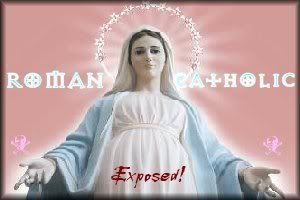
Order Copies of This Book for Your Catholic Family, Neighbors, & Friends
The Catechism admonishes members to pray to those who, because of their good works, have been declared by the church to be "saints:"
This chapter must begin by defining the word "saint." Catholicism teaches that a saint is one of a select few who, because of good works while alive, is declared a saint after death:
According to Scripture, however, anyone who is born again by faith in Christ is a saint. Paul wrote to all the saints (Christians) in Rome:
Many other verses express the same truth:
(See also Acts 9:13; 9:32; 9:41; 26:10; Romans 8:27; 12:13; 15:25; 15:26; 15:31; 16:2; 16:15; 1 Corinthians 6:1, 2 Corinthians 1:1, Ephesians 1:1, plus dozens of other New Testament references.) Why this Doctrine? In short, the scenario goes like this. Catholicism discarded the scriptural definition of a "saint" and devised a new one, then instructed members to pray to these unscriptural "saints." The question is, why pray to anyone else when the God of the universe is in heaven waiting to hear and answer prayers? Are "Saints" Intercessors? Supposedly, these so-called saints "intercede with the Father for us." But we have already learned that Jesus Christ is our only intercessor. Therefore, to suggest otherwise is but a man made tradition. Here's another interesting Catechism quote concerning saints:
According to the Catholic church, praying to saints brings people closer to Christ. However, you will not find this doctrine in Scripture either. It is another tradition of men that neither Jesus nor the Bible ever taught. In fact, this practice of communing with the dead treads dangerously close to necromancy, another practice strongly condemned in the Bible. (See Deuteronomy 18:10-12.) Conclusion The nagging question you must answer here is: Why would the Catholic church rather have members pray to dead men than to the living, all-powerful, prayer-answering God? Keep in mind that if these traditions of men are not true, then all your prayers to "saints" are but worthless chatter. If you pray to God, though, you may claim many wonderful Biblical promises:
|


